Module 11 Unit 3 Language in use课件(共32张PPT)
文档属性
| 名称 | Module 11 Unit 3 Language in use课件(共32张PPT) | 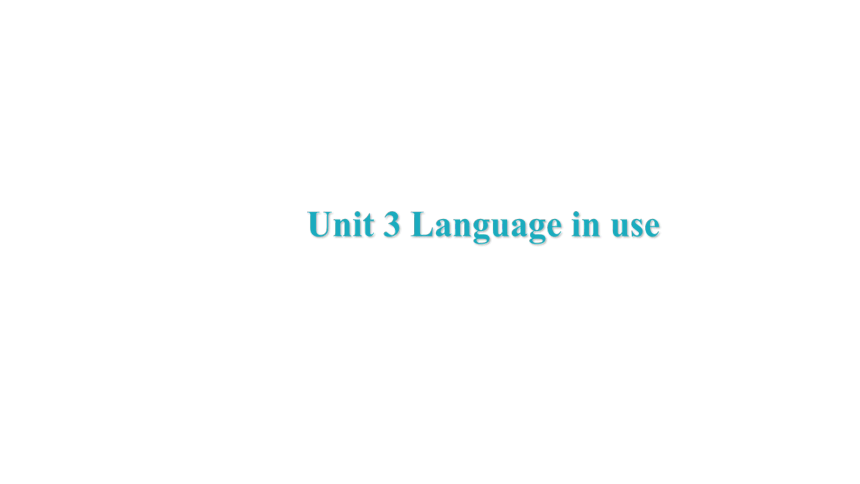 | |
| 格式 | ppt | ||
| 文件大小 | 244.0KB | ||
| 资源类型 | 教案 | ||
| 版本资源 | 外研版 | ||
| 科目 | 英语 | ||
| 更新时间 | 2022-08-14 11:24:10 | ||
图片预览

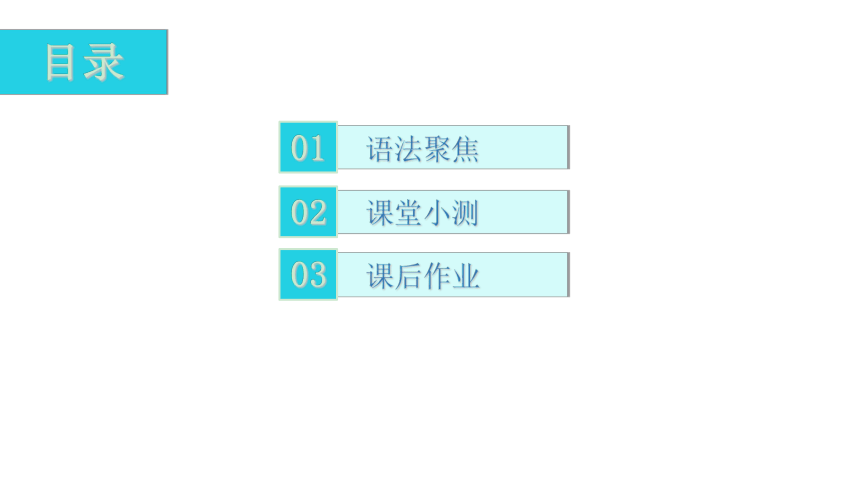
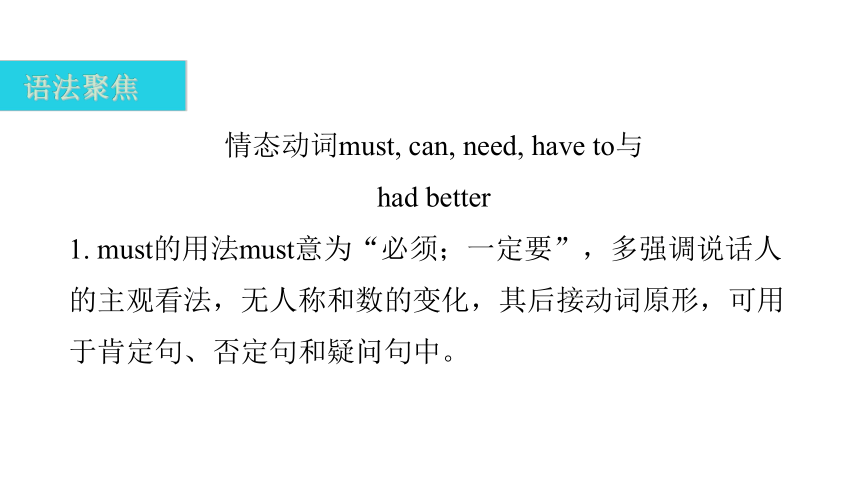
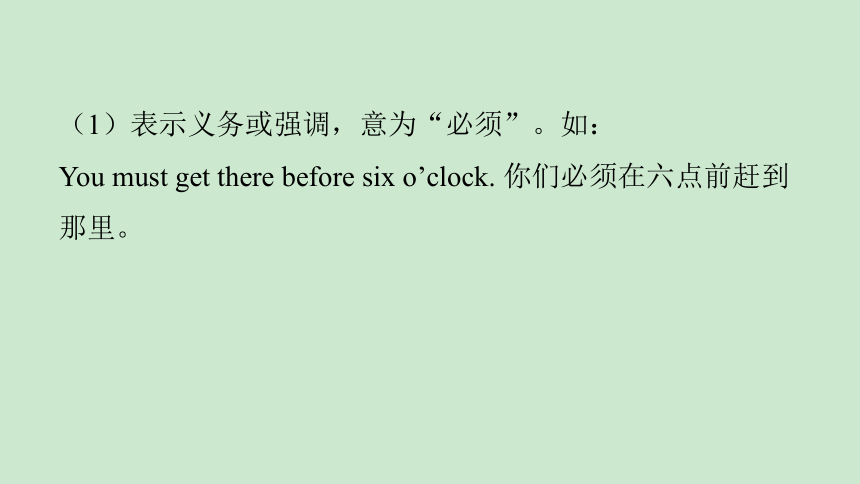
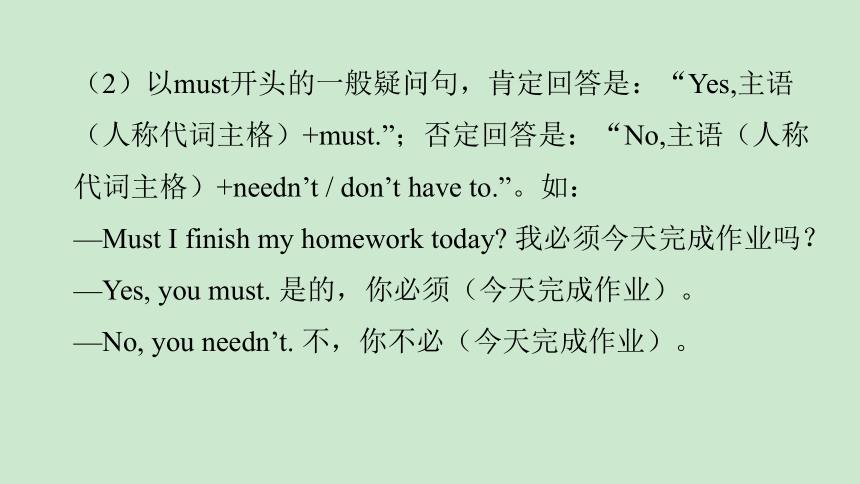
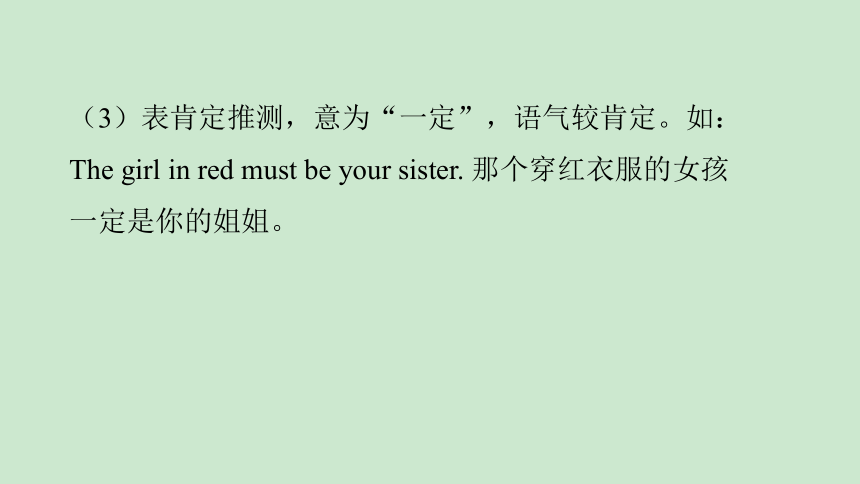
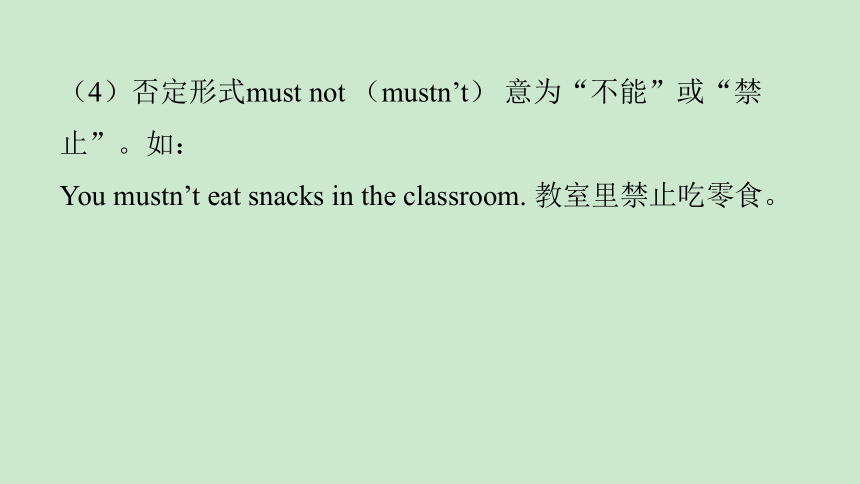

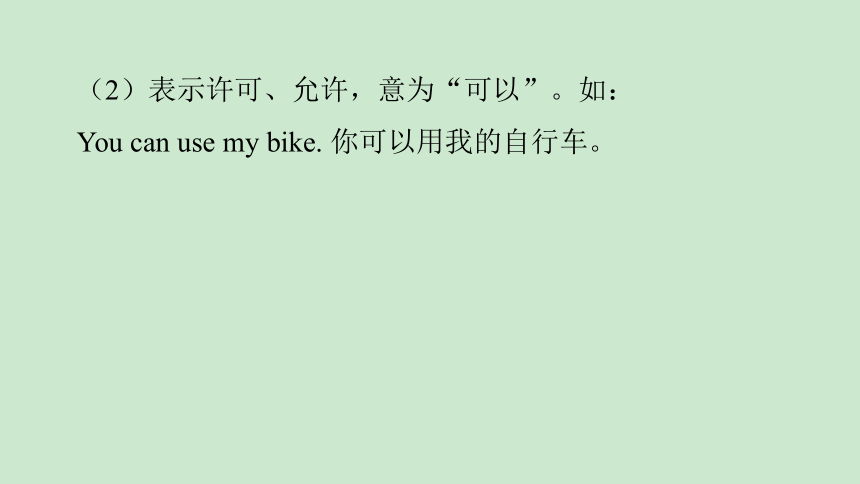
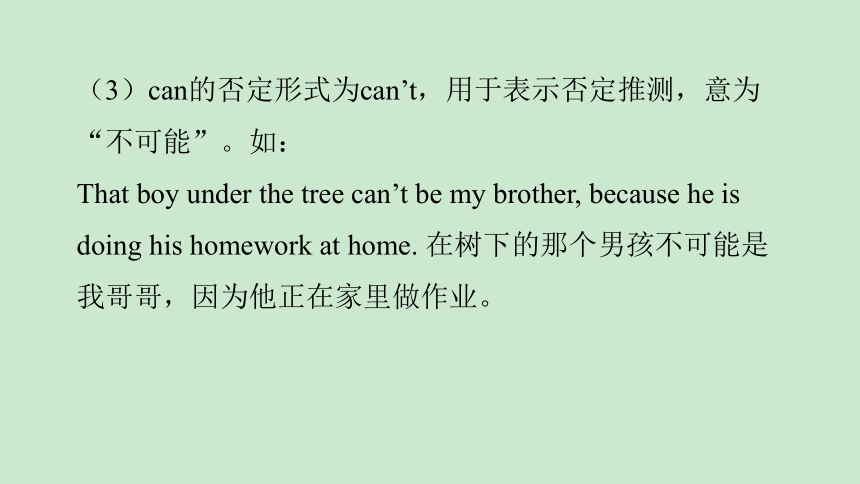
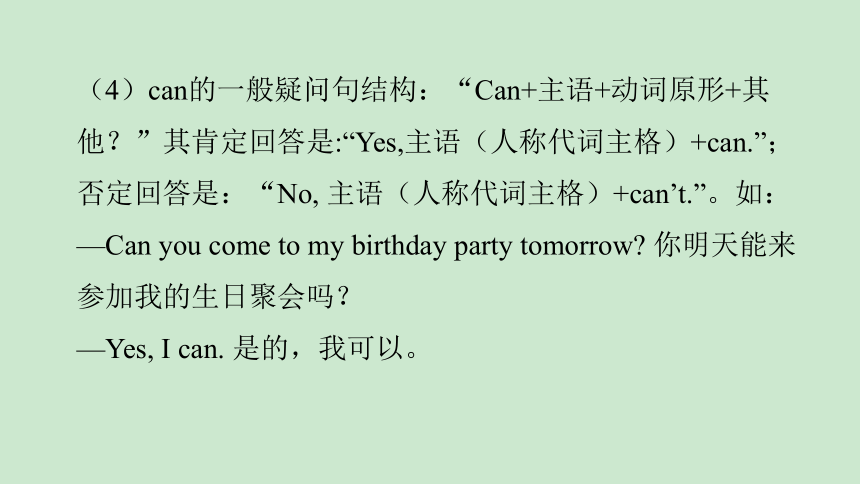
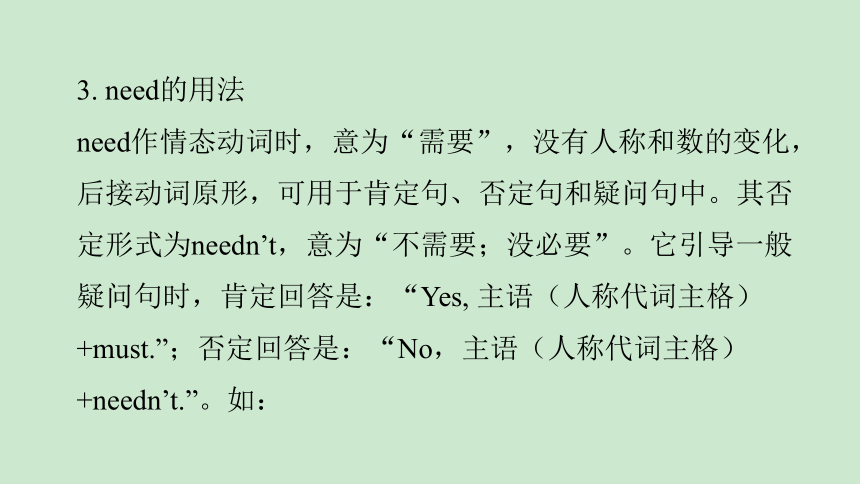
文档简介
(共32张PPT)
Unit 3 Language in use
目录
语法聚焦
01
课堂小测
02
课后作业
03
语法聚焦
情态动词must, can, need, have to与
had better
1. must的用法must意为“必须;一定要”,多强调说话人的主观看法,无人称和数的变化,其后接动词原形,可用于肯定句、否定句和疑问句中。
(1)表示义务或强调,意为“必须”。如:
You must get there before six o’clock. 你们必须在六点前赶到那里。
(2)以must开头的一般疑问句,肯定回答是:“Yes,主语(人称代词主格)+must.”;否定回答是:“No,主语(人称代词主格)+needn’t / don’t have to.”。如:
—Must I finish my homework today 我必须今天完成作业吗?
—Yes, you must. 是的,你必须(今天完成作业)。
—No, you needn’t. 不,你不必(今天完成作业)。
(3)表肯定推测,意为“一定”,语气较肯定。如:The girl in red must be your sister. 那个穿红衣服的女孩一定是你的姐姐。
(4)否定形式must not (mustn’t) 意为“不能”或“禁止”。如:
You mustn’t eat snacks in the classroom. 教室里禁止吃零食。
2. can的用法
(1)表示能力,意为“能;会”。如:
I can sing this song in English. 我能用英语唱这首歌。
(2)表示许可、允许,意为“可以”。如:
You can use my bike. 你可以用我的自行车。
(3)can的否定形式为can’t,用于表示否定推测,意为“不可能”。如:
That boy under the tree can’t be my brother, because he is doing his homework at home. 在树下的那个男孩不可能是我哥哥,因为他正在家里做作业。
(4)can的一般疑问句结构:“Can+主语+动词原形+其他?”其肯定回答是:“Yes,主语(人称代词主格)+can.”;否定回答是:“No, 主语(人称代词主格)+can’t.”。如:
—Can you come to my birthday party tomorrow 你明天能来参加我的生日聚会吗?
—Yes, I can. 是的,我可以。
3. need的用法
need作情态动词时,意为“需要”,没有人称和数的变化,后接动词原形,可用于肯定句、否定句和疑问句中。其否定形式为needn’t,意为“不需要;没必要”。它引导一般疑问句时,肯定回答是:“Yes, 主语(人称代词主格)+must.”;否定回答是:“No,主语(人称代词主格)+needn’t.”。如:
You needn’t do it again. 你不需要再做了。
—Need he do his homework first 他需要先做作业吗?
—Yes, he must./ No, he needn’t. 是的,他需要(先做作业)。 / 不,他不需要(先做作业)。
注意:need作实义动词时,意为“需要”,后接名词、代词、不定式(以人作主语)、动名词(以物作主语)作宾语;在句子中有人称和数的变化。如:
Our classroom needs cleaning now. 我们的教室现在需要打扫。
4. have to的用法
have to意为“必须”,侧重于客观需要,含有“不得不;被迫”的意思。 与must有区别,must侧重于说话者的主观看法。如:
My bike was broken yesterday, so I had to walk to school. 昨天我的自行车坏了,所以我只能走路去学校。
All passengers must wear seat belts. 所有乘客都要系安全带。
5. had better的用法
had better意为“最好”,表示劝告或建议,后接动词原形,一般不用于疑问句中,但可用于否定句中,其否定形式为had better not。如:
You’d better get some sleep. 你最好睡一会儿。
课堂小测
serious
astes
一、根据中文意思或首字母提示,用单词的适当形式填空,每空一词
1. This orange looks nice but t________ very terrible.
2. My maths teacher is really_________________ (认真严肃的) about his work.
accept
mmediately
shoulder
3.The company wanted him to work there, but he didn’t_________________ (接受) it.
4.—Bob, would you mind moving your bike
—Sorry! I’ll do it i _________________.
5. I touched his________ (肩膀) and said hello to him.
Must
go
二、按要求完成句子,每空一词
6. Betty must go and see her grandpa this weekend.(改为一般疑问句,并作否定回答)
—_________________ Betty_________________ and see her grandpa this weekend
—No, she_________________.
needn’t
don't
think
should
7. I think you should call your uncle now. (改为否定句)
I_________________ _________________ you _________________ call your uncle now.
8. You’d better wear a red shirt tomorrow. (改为否定句)
You’d _________________ _________________ _________________ a red shirt tomorrow.
better
not
wear
mustn’t
9. You must practise the piano this morning. (改为否定句)
You _________________ _________________ the piano this morning.
10.You can’t use his dictionary, _________________ _________________ (写出反义疑问句)
practise
can
you
D
三、单项填空
( )11. The designer has tried every possible way to make the robot light, so you _________________ worry about its weight.
A. must B. may
C. can’t D. needn’t
A
( )12. According to the notice, guests at this hotel _________________ use the sports centre at no extra cost.
A. can B. should
C. must D. need
B
( )13. As middle school students, we _________________ follow the public rules wherever we go.
A. would B. should
C. might D. could
( )14. —Some people don’t show their talents at the very beginning.
—I agree. Even Einstein _________________ read until he was seven.
A. can’t B. mustn’t
C. couldn’t D. needn’t
C
( )15. —Can we walk across the road now
—No, we _________________. We have to wait until the light turns green.
A. couldn’t B. needn’t
C. shouldn’t D. mustn’t
D
四、语法选择 (核心素养:文化意识、思维品质) Numbers in different countries may have different meanings. In China, some people think that some numbers bring 16 good luck. Take “8” for example. The Chinese pronunciation of the number “8” has almost the same sound as that of the Chinese character “发”,which means making a fortune. 17 ,
many Chinese people spend a lot of money to get their telephone numbers or car numbers 18 this number “8”. They believe without any doubt(疑问) that the number 19 them money.
However, 20 don’t believe that numbers have anything to do with good luck. They think such 21 idea is only an ignorant(愚昧的) and superstitious(迷信的) belief. A number is one thing, and good luck is another. They will ask, “ 22 can you ever have any good luck simply because of some lucky numbers, even if you don’t work hard, don’t have good chances and don’t get along well with the people around you?”
As for me, I agree with the latter(后者). 23 , lucky numbers are only a kind of superstition(迷信). Perhaps it holds true in a way, but often it does not. Numbers can 24 bring good luck to a person at all and our fortune(命运) is in our own hands. So everyone 25 have a good fortune only if he tries his best. Let’s always remember “Chances are only for the prepared mind.” and “No pains, no gains.”
( )16. A. they B. their C. them D. themselves
( )17. A. Therefore B. Otherwise
C. However D. Moreover
( )18. A. for B. in C. on D. with
( )19. A. bring B. will bring
C. brought D. is bringing
( )20. A. other B. the other C. another D. others
C
A
B
D
D
( )21. A. An B. a C. the D. /
( )22. A. Why B. What C. How D. When
( )23. A. Clear B. Clearer C. Clearly D. More clearly
( )24. A. never B. ever C. sometimes D. often
( )25. A. should B. must C. need D. can
A
C
C
A
D
Unit 3 Language in use
目录
语法聚焦
01
课堂小测
02
课后作业
03
语法聚焦
情态动词must, can, need, have to与
had better
1. must的用法must意为“必须;一定要”,多强调说话人的主观看法,无人称和数的变化,其后接动词原形,可用于肯定句、否定句和疑问句中。
(1)表示义务或强调,意为“必须”。如:
You must get there before six o’clock. 你们必须在六点前赶到那里。
(2)以must开头的一般疑问句,肯定回答是:“Yes,主语(人称代词主格)+must.”;否定回答是:“No,主语(人称代词主格)+needn’t / don’t have to.”。如:
—Must I finish my homework today 我必须今天完成作业吗?
—Yes, you must. 是的,你必须(今天完成作业)。
—No, you needn’t. 不,你不必(今天完成作业)。
(3)表肯定推测,意为“一定”,语气较肯定。如:The girl in red must be your sister. 那个穿红衣服的女孩一定是你的姐姐。
(4)否定形式must not (mustn’t) 意为“不能”或“禁止”。如:
You mustn’t eat snacks in the classroom. 教室里禁止吃零食。
2. can的用法
(1)表示能力,意为“能;会”。如:
I can sing this song in English. 我能用英语唱这首歌。
(2)表示许可、允许,意为“可以”。如:
You can use my bike. 你可以用我的自行车。
(3)can的否定形式为can’t,用于表示否定推测,意为“不可能”。如:
That boy under the tree can’t be my brother, because he is doing his homework at home. 在树下的那个男孩不可能是我哥哥,因为他正在家里做作业。
(4)can的一般疑问句结构:“Can+主语+动词原形+其他?”其肯定回答是:“Yes,主语(人称代词主格)+can.”;否定回答是:“No, 主语(人称代词主格)+can’t.”。如:
—Can you come to my birthday party tomorrow 你明天能来参加我的生日聚会吗?
—Yes, I can. 是的,我可以。
3. need的用法
need作情态动词时,意为“需要”,没有人称和数的变化,后接动词原形,可用于肯定句、否定句和疑问句中。其否定形式为needn’t,意为“不需要;没必要”。它引导一般疑问句时,肯定回答是:“Yes, 主语(人称代词主格)+must.”;否定回答是:“No,主语(人称代词主格)+needn’t.”。如:
You needn’t do it again. 你不需要再做了。
—Need he do his homework first 他需要先做作业吗?
—Yes, he must./ No, he needn’t. 是的,他需要(先做作业)。 / 不,他不需要(先做作业)。
注意:need作实义动词时,意为“需要”,后接名词、代词、不定式(以人作主语)、动名词(以物作主语)作宾语;在句子中有人称和数的变化。如:
Our classroom needs cleaning now. 我们的教室现在需要打扫。
4. have to的用法
have to意为“必须”,侧重于客观需要,含有“不得不;被迫”的意思。 与must有区别,must侧重于说话者的主观看法。如:
My bike was broken yesterday, so I had to walk to school. 昨天我的自行车坏了,所以我只能走路去学校。
All passengers must wear seat belts. 所有乘客都要系安全带。
5. had better的用法
had better意为“最好”,表示劝告或建议,后接动词原形,一般不用于疑问句中,但可用于否定句中,其否定形式为had better not。如:
You’d better get some sleep. 你最好睡一会儿。
课堂小测
serious
astes
一、根据中文意思或首字母提示,用单词的适当形式填空,每空一词
1. This orange looks nice but t________ very terrible.
2. My maths teacher is really_________________ (认真严肃的) about his work.
accept
mmediately
shoulder
3.The company wanted him to work there, but he didn’t_________________ (接受) it.
4.—Bob, would you mind moving your bike
—Sorry! I’ll do it i _________________.
5. I touched his________ (肩膀) and said hello to him.
Must
go
二、按要求完成句子,每空一词
6. Betty must go and see her grandpa this weekend.(改为一般疑问句,并作否定回答)
—_________________ Betty_________________ and see her grandpa this weekend
—No, she_________________.
needn’t
don't
think
should
7. I think you should call your uncle now. (改为否定句)
I_________________ _________________ you _________________ call your uncle now.
8. You’d better wear a red shirt tomorrow. (改为否定句)
You’d _________________ _________________ _________________ a red shirt tomorrow.
better
not
wear
mustn’t
9. You must practise the piano this morning. (改为否定句)
You _________________ _________________ the piano this morning.
10.You can’t use his dictionary, _________________ _________________ (写出反义疑问句)
practise
can
you
D
三、单项填空
( )11. The designer has tried every possible way to make the robot light, so you _________________ worry about its weight.
A. must B. may
C. can’t D. needn’t
A
( )12. According to the notice, guests at this hotel _________________ use the sports centre at no extra cost.
A. can B. should
C. must D. need
B
( )13. As middle school students, we _________________ follow the public rules wherever we go.
A. would B. should
C. might D. could
( )14. —Some people don’t show their talents at the very beginning.
—I agree. Even Einstein _________________ read until he was seven.
A. can’t B. mustn’t
C. couldn’t D. needn’t
C
( )15. —Can we walk across the road now
—No, we _________________. We have to wait until the light turns green.
A. couldn’t B. needn’t
C. shouldn’t D. mustn’t
D
四、语法选择 (核心素养:文化意识、思维品质) Numbers in different countries may have different meanings. In China, some people think that some numbers bring 16 good luck. Take “8” for example. The Chinese pronunciation of the number “8” has almost the same sound as that of the Chinese character “发”,which means making a fortune. 17 ,
many Chinese people spend a lot of money to get their telephone numbers or car numbers 18 this number “8”. They believe without any doubt(疑问) that the number 19 them money.
However, 20 don’t believe that numbers have anything to do with good luck. They think such 21 idea is only an ignorant(愚昧的) and superstitious(迷信的) belief. A number is one thing, and good luck is another. They will ask, “ 22 can you ever have any good luck simply because of some lucky numbers, even if you don’t work hard, don’t have good chances and don’t get along well with the people around you?”
As for me, I agree with the latter(后者). 23 , lucky numbers are only a kind of superstition(迷信). Perhaps it holds true in a way, but often it does not. Numbers can 24 bring good luck to a person at all and our fortune(命运) is in our own hands. So everyone 25 have a good fortune only if he tries his best. Let’s always remember “Chances are only for the prepared mind.” and “No pains, no gains.”
( )16. A. they B. their C. them D. themselves
( )17. A. Therefore B. Otherwise
C. However D. Moreover
( )18. A. for B. in C. on D. with
( )19. A. bring B. will bring
C. brought D. is bringing
( )20. A. other B. the other C. another D. others
C
A
B
D
D
( )21. A. An B. a C. the D. /
( )22. A. Why B. What C. How D. When
( )23. A. Clear B. Clearer C. Clearly D. More clearly
( )24. A. never B. ever C. sometimes D. often
( )25. A. should B. must C. need D. can
A
C
C
A
D
同课章节目录
- Module 1 How to learn English
- Unit 1 Let's try to speak English as much as possi
- Unit 2 You should smile at her.
- Unit 3 Language in use .
- Module 2 My home town and my country
- Unit 1 It's taller than many other buildings.
- Unit 2 Cambridge is a beautiful city in the east o
- Unit 3 Language in use .
- Module 3 Sports.
- Unit 1 Nothing is more exciting than playing tenni
- Unit 2 This year we training more carefully.
- Unit 3 Language in use .
- Module 4 Planes, ships and trains .
- Unit 1 He lives the farthest from school.
- Unit 2 What is the best way to travel.
- Unit 3 Language in use .
- Module 5 Lao She Teahouse.
- Unit 1 I wanted to see the Beijing Opera.
- Unit 2 It descibes the changes in Chinese society.
- Unit 3 Language in use .
- Module 6 Animals in danger.
- Unit 1 It allows people to get closer to them .
- Unit 2 The WWF is working hard to save them all.
- Unit 3 Language in use .
- Revision module A
- Module 7 A famous story
- Unit 1 Alice was sitting with her sister by the ri
- Unit 2 She was thinking about her cat.
- Unit 3 Language in use .
- Module 8 Accidents
- Unit 1 While the car were changing to red, a car s
- Unit 2 I was trying to pick it up when it bite me
- Unit 3 Language in use .
- Module 9 Population
- Unit 1 The population of China is about 1.37 billi
- Unit 2 Arnwick was a city with 200,000 people.
- Unit 3 Language in use .
- Module 10 The weathe
- Unit 1 It might snow.
- Unit 2 The weather is fine all year round.
- Unit 3 Language in use .
- Module 11 Way of life
- Unit 1 In China ,we open a gift later.
- Unit 2 In England, you usually drink tea with milk
- Unit 3 Language in use .
- Module 12 Help
- Unit 1 What should we do before help arrives?
- Unit 2 Stay away from windows and heavy furniture.
- Unit 3 Language in use .
- Revision module B
